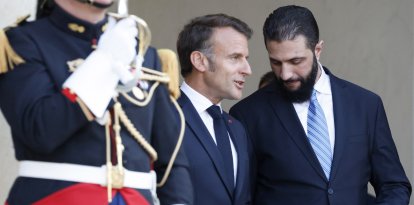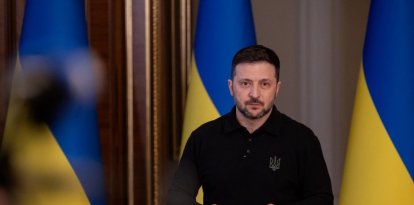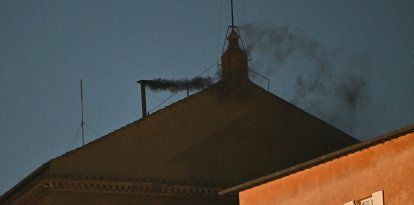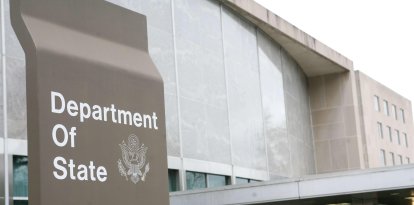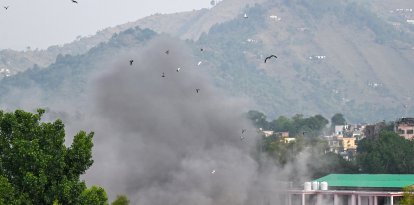Ortega's regime in Nicaragua intensifies its political persecution with a legal reform
Modifications to the Nicaraguan Penal Code allow opponents to be prosecuted from abroad as well as individuals who post anti-regime messages on social media.
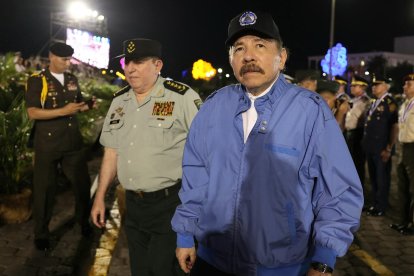
Nicaraguan autocrat, Daniel Ortega, during a military holiday.
A recentlyly approved package of legal reforms in Nicaragua has become yet another tool in the political persecution of critics of leader Daniel Ortega, both within the country and abroad. The reforms also intensify the regime's pressure on the Catholic Church.
These reforms to the Penal Code enable the prosecution of individuals who oppose the Ortega from abroad, while ammendments to the cybercrime law pave the way for convicting people based on their social media posts.
Two other laws were also amended. One imposes taxes on churches and the other restricts NGOs to working only in partnership with state entities (Ortega has already closed down around 5,500 NGOs and confiscated their assets).
Camila Ormar, a lawyer for the NGO Center for Justice and International Law (Cejil), told AFP that these initiatives "seek to create a legal framework that legitimizes new practices that violate human rights."
"These reforms could be used to intensify the persecution and repression even more of Nicaraguans, including in exile," said Christian Salazar Volkmann, head of the UN High Commissioner for Human Rights.
In an annual report on the situation in Nicaragua, the High Commissioner's office warned of a "serious" deterioration under the government of Ortega and his wife, Vice President Rosario Murillo. The report highlighted arbitrary arrests of opponents as well as torture and mistreatment of detainees.
This report, debated in Geneva in September by the UN Human Rights Council, was rejected by Nicaragua's attorney general, Wendy Morales.
Ortega's supporters argue that this reform package strengthens institutions and makes it possible to combat crime on a "transnational" level.
"These reforms are aimed at strengthening the work of our country's institutions in charge of confronting transnational organized crime," said María Auxiliadora Martínez, a pro-government deputy, in a parliamentary session.
However, Cejil's lawyer emphasized that "it is not the first time in Nicaragua that laws are reformed to criminalize those who are considered to be opponents or dissident voices."
"The laws adopted or reformed by Nicaragua must adhere to the human rights treaties recognized by the State," Ormar pointed out.
Ortega's regime has intensified its repression since the 2018 opposition protests, which left over 300 people dead in just three months, according to the UN. Since then, thousands of Nicaraguans have fled into exile and hundreds have been expelled, with their property confiscated.
The 78-year-old former guerrilla who ruled Nicaragua in the 1980s and returned to power in 2007, claims that the protests were a coup attempt sponsored by Washington.
Gagging law
The reformed Penal Code imposes penalties of up to 30 jail terms for individuals who commit "crimes against the State or its institutions," whether in Nicaragua or abroad.
Meanwhile, the cybercrime law imposes sanctions for social media posts and smartphone apps that cause "alarm," with penalties of up to 10 years in prison.
According to Cejil, these types of sanctions are "incompatible with the principle of legality provided for in the American Convention on Human Rights."
Prosecuting people who are outside the country will lead to "trials in absentia," warned the head of Cejil.
Justifying outrage
The reform to the cybercrime law tightened a regulation that has been in place since 2020, often criticized as a "gag law," which led to the prosecution and arrest of many Nicaraguan opponents and journalists for allegedly "spreading false news."
Nicaraguan lawyer Salvador Marenco, exiled in Costa Rica, told AFP "These crimes have provoked the denationalization of multiple people," alluding to the fact that Ortega stripped the nationality of 451 exiled opponents.
Marenco claimed that this "policy of transnational repression" is Ortega's reaction to the sanctions of the United States and the European Union.
Former Nicaraguan Ambassador Arturo McFields told AFP that Ortega is trying to use these reforms to "justify his outrages and his crimes and also to give legal character" to his repressive actions.
"They first carry out these actions by deed and then try to structure a legal framework," added the former ambassador to the Organization of American States (OAS), who is exiled in the United States.
RECOMMENDATION
